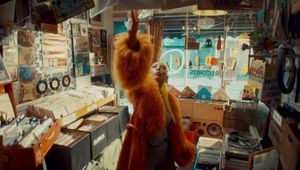
AI in Our Creative Process: A Partnership with Purpose

Every day there seems to be a new article written about Artificial Intelligence (AI) and how it’s going to remove the need for humans in the traditional workspace. The film and production industry is certainly not immune to this and has already started pushing back.
This was most prominently thrust into the spotlight in 2023 when the Writers Guild of America (WGA) went on strike for one of the longest periods in their history. The growing use of AI became one of the key driving forces behind the strikes, with concerns from both actors and writers that unchecked AI could dramatically reshape the industry and undermine their roles by pitting artists against technology in a battle over human creativity.
At a more local level, the AI hype has been based on streamlining the content creation and production process - something that could be conceived as a threat, but could also be the catalyst our industry needs to embrace as a way of moving forward.
AI isn't just a buzzword for us—it's an integral part of our innovation. At Ocurens and Monumental, we leverage cutting-edge AI techniques to enhance our creative output, proving that technology and artistry can coexist.
Don’t misunderstand us, our directors aren’t AI directors, but the conversation around AI’s role in production is both unavoidable and welcomed as we plan out each project, using the technology and tools available to us to deliver the best content for our clients.
Despite the concerns, we can’t ignore AI's capabilities. Yes, at a basic level, AI can turn an angry email into a polite one, but we harness it for much more—accelerating post-production, cleaning up footage, and generating assets. We do believe it’s crucial to blend AI with traditional CGI techniques to maintain authenticity. Ironically, CGI feels more soulful than pure AI creations because of the involvement of the human touch.
During the ideation stage, AI is invaluable. The days of 80-page treatments are over; we advocate for pre-visualizations and tests using AI. We encourage the Agencies and clients we work with to embrace this shift for more dynamic and (cost) efficient projects.
We've been vocal about these views, especially at a FOCUS panel held event earlier this year. During this industry get together there were plenty of people warning us about the long term impact of AI on the human and creative aspect of our industry. However, since then, AI-generated commercials have grown in popularity.
This growth has, in truth, highlighted AI's limitations more than its promise. Whilst they may have been produced far quicker and more cost efficiently, they have not delivered. Many of these commercials often miss the mark, raising legal and ethical questions - highlighting the need for more human input.
Nostalgia and clichés, the essence of humanity, can't be replicated by AI. The resurgence of shooting on film is a testament to our craving for the human touch and resistance to digital takeover, and while we acknowledge AI's potential to evolve, for now, these human nuances remain our domain.
However, for us, this is a tool that, if utilised properly and with some careful thought and consideration, can expedite the evolution of our industry over the next few years. The key is collaboration, not competition, with AI. Emotions like love, hate, remorse, and excitement are uniquely human experiences and are challenging for AI to replicate - we have to be there to add that in.
We are all excited about how the latest innovation and technology can help us, but we need to give it the direction it needs to succeed and use it as an aid and not the solution.
If you want to learn more about how we’re using AI to boost our production and creative potential, get in touch. Let’s explore the future together.















